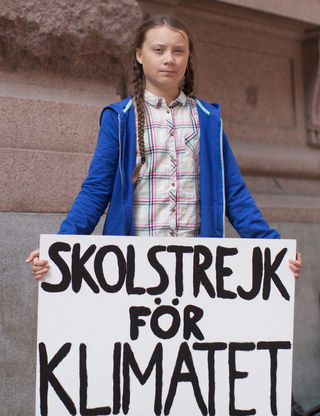
Depression
We Should Listen to Greta Thunberg
Our youth activists pressure us to envision a better future.
Posted September 24, 2019

Last year, Greta Thunberg began holding up a sign outside of the Swedish parliament demanding action on climate change. What began as a solitary action now has all the makings of a movement, and Thunberg was recently invited to address the United Nations.
She did not hold back in her speech: "I shouldn't be up here. I should be back at school on the other side of the ocean," the 16-year-old from Sweden told the United Nations Climate Action Summit. "Yet you all come to us young people for hope. How dare you! You have stolen my dreams and my childhood with your empty words."
I've spent the summer reading through the beautiful new box set of Wendell Berry's essays from the Library of America, and I think the octogenarian Kentucky farmer and writer would agree with Thunberg about the damage we've done to the earth we call home. Beginning with The Long-Legged House (1969) through The Art of Loading Brush (2017), Berry has surveyed the natural world and pondered the cost of the methods we've created in an attempt to tame it and harness its productivity.
In one notable essay titled "The Agrarian Standard" (2003), Berry reflects upon his career upon what was then the twenty-fifth anniversary of one of his most celebrated essay collections, The Unsettling of America. In the years since that book, Berry writes,
"we have less than half the number of farmers in the United States that we had in 1977. Our farm communities are far worse off now than they were then. Our soil erosion rates continue to be unsustainably high. We continue to pollute our soils and streams with agricultural poisons. We continue to lose farmland to urban development of the most wasteful sort. The large agribusiness corporations that were mainly national in 1977 are now global, and are replacing the world’s agricultural diversity, which was useful primarily to farmers and local consumers, with bioengineered and patented monocultures that are merely profitable to corporations. The purpose of this now global economy, as Vandana Shiva has rightly said, is to replace 'food democracy' with a worldwide 'food dictatorship.'"
The fundamental difference between the agrarian vision of farming and that of modern agribusiness is the latter sees the earth as a potential source of profit while the former sees it as "the proper use and care of an immeasurable gift," in Berry's words. Industrialism proposes one size fits all solutions and has contempt for the small and the local. The continued dominance of this way of life spells crisis for us all.
How, then, are we to move on in the face of such despair? One option has been to pretend that it doesn't exist. Modern industrial farming could not function on the scale it does without subsidies to prop up its production, money that often goes into the pockets of large corporations instead of individuals. Subsidies also don't require us to be attuned to the needs of the land; we can keep pushing out crops in surplus quantities that damage the earth because the money will still be there. Recently the $28 billion the Trump administration earmarked for farmers to offset the impact of our trade war with China has made the news, but this is just a particularly egregious example of a dynamic that has existed for decades.
The other option is harder, of course: to confront the damaging legacies of our practices and work to fix them. It's been noted that anxiety and depression are on the rise in youth, and while no single factor is to blame we cannot ignore the fact that young people are confronted every day with the reality of the rapidly-warming world they will inherit. We can treat the mental health symptoms, of course, but we ignore the causes at our peril. Thunberg and others are trying to warn us. Hopefully, we will begin to listen.

